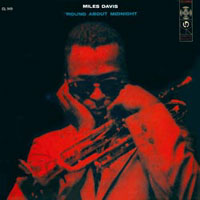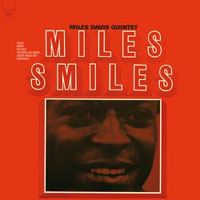Miles Davis Quintet • Round About Midnight
Miles Davis Quintet • Miles Smiles
ike the Beatles and Beethoven, Miles Davis earned his renown by consistently coloring outside the lines, pushing his music, and the music of the day, in new and important directions. These two records made ten years apart are proof -- they are more different than alike. The music begins with hard bop and ends up in a bolder and more exploratory kind of jazz. While both records feature the Miles Davis Quintet, the lineups are vastly different. Every musician wanted to play with Miles, and the best often did. Round About Midnight was Miles' debut for Columbia, the label that would release his most celebrated recordings. It features the classic first roster of the Quintet: Philly Joe Jones on drums, Paul Chambers on bass, Red Garland on piano and a then-little-known John Coltrane on sax. The title tune, a Thelonious Monk standard, is given its definitive treatment here, and Miles' muted trumpet is perhaps in its finest recorded form. On Miles Smiles, only Davis remains from the early Quintet. Three of the new members were still in their 20s: Herbie Hancock on piano, Tony Williams on drums and Ron Carter on bass. Wayne Shorter tries to walk in John Coltrane's giant steps. Three of the tunes are Shorter compositions. The opener, "Orbits," sets a frenetic pace and introduces the unsettling rhythms that dominate the record. Any remnants of swing are gone, buried under the probing nature of the Quintet's mighty leader. Another difference: Round About Midnight is in mono and Miles Smiles in stereo. Both sound up-front and vivid, but there is no highlighting of particular regions. A six-eye original of Round About Midnight has a slight rise in the treble compared to this reissue, and it also lacks some bass bloom and weight, not to mention having far more surface noise. The exceptionally quiet vinyl continues to prove that Speakers Corners is a leader in terms of pressing quality. Both of these LPs display the sonic acuity that makes
analog playback the choice of those listeners who care most about fidelity. Miles Davis
made so many great records in the decade between these two, and I'm not alone in hoping
that Speakers Corner decides to re-release them. |


